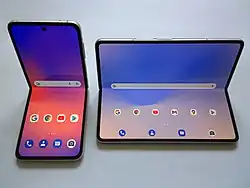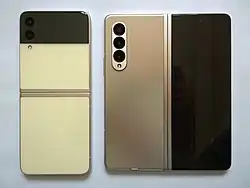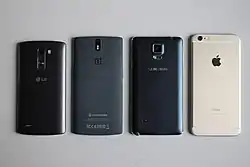smartphone
See also: Smartphone and smart phone
English

Samsung smartphones (frontside)

Samsung smartphones (backside)
Noun
smartphone (plural smartphones)
- A mobile phone with more advanced features and greater computing capacity than a featurephone.
- Hypernym: mobile phone
- Hyponym: iPhone
Derived terms
Translations
electronic handheld device
|
Further reading
 smartphone on Wikipedia.Wikipedia
smartphone on Wikipedia.Wikipedia  Category:Smartphones on Wikimedia Commons.Wikimedia Commons
Category:Smartphones on Wikimedia Commons.Wikimedia Commons
Dutch
Etymology
Borrowed from English smartphone.
Pronunciation
- IPA(key): /ˈsmɑrt.foːn/, [ˈsmɑɹt.foːn], [ˈsmɑɹt.foʊ̯n]
Audio (file) - Hyphenation: smart‧phone
Related terms
French
Etymology
Borrowed from English smartphone.
Pronunciation
- IPA(key): /smaʁt.fɔn/
Audio (Paris) (file)
Noun
smartphone m (plural smartphones)
- smartphone
- Synonyms: ordiphone, supertéléphone, téléphone intelligent
Italian

Quattro smartphone — Four smartphones
Etymology
Unadapted borrowing from English smartphone.
Pronunciation
- IPA(key): /ˈzmart.fon/, /ˈzmart.fɔn/
- Rhymes: -artfon, -artfɔn
- Hyphenation: smàrt‧phone
Noun
smartphone m (invariable)
- (mobile telephony) smartphone
- Da quando hai uno smartphone? ― Since when have you had a smartphone?
Further reading
- smartphone in Treccani.it – Vocabolario Treccani on line, Istituto dell'Enciclopedia Italiana
Portuguese
Etymology
Unadapted borrowing from English smartphone.
Pronunciation
- (Brazil) IPA(key): /iz.maʁ.t͡ʃiˈfõ.ni/ [iz.mah.t͡ʃiˈfõ.ni], /iz.maʁt͡ʃˈfõ.ni/ [iz.maht͡ʃˈfõ.ni]
- (São Paulo) IPA(key): /iz.maɾ.t͡ʃiˈfõ.ni/, /iz.maɾt͡ʃˈfõ.ni/
- (Rio de Janeiro) IPA(key): /iʒ.maʁ.t͡ʃiˈfõ.ni/ [iʒ.maχ.t͡ʃiˈfõ.ni], /iʒ.maʁt͡ʃˈfõ.ni/ [iʒ.maχt͡ʃˈfõ.ni]
- (Southern Brazil) IPA(key): /iz.maɻt͡ʃˈfo.ne/, /iz.maɻ.t͡ʃiˈfo.ne/
- (Portugal) IPA(key): /ˌsmaɾˈtfo(w)n/, /ˌsmaɾˈtfɔ.nɨ/
- (Northern Portugal) IPA(key): /ˌsmaɾˈtfown/, /ˌsmaɾˈtfɔ.nɨ/
- (Southern Portugal) IPA(key): /ˌsmaɾˈtfon/, /ˌsmaɾˈtfɔ.nɨ/
Spanish
Etymology
Unadapted borrowing from English smartphone.
Pronunciation
- IPA(key): /smaɾdˈfon/ [zmaɾð̞ˈfõn], /esmaɾdˈfon/ [ez.maɾð̞ˈfõn]
- Rhymes: -on
Usage notes
According to Royal Spanish Academy (RAE) prescriptions, unadapted foreign words should be written in italics in a text printed in roman type, and vice versa, and in quotation marks in a manuscript text or when italics are not available. In practice, this RAE prescription is not always followed.
This article is issued from Wiktionary. The text is licensed under Creative Commons - Attribution - Sharealike. Additional terms may apply for the media files.